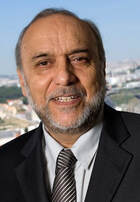|
EDITORIAL
Eduardo Graça Presidente da CASES . . . . . . . . . . . . . . . . . . . . . . . . . . . . . . . . . . . . . . . . . . . . . . . . . . . . . . . . . . . . . . . . . . . . . Neste outono de 2021 damos à estampa o décimo quarto número da “Economia Social – Leituras & Debates”, revista trimestral, bilingue (português e inglês), editada em formato exclusivamente digital. O tempo corre depressa e a morte vai deixando pelo caminho notáveis protagonistas do campo da economia social cuja memória nos compete preservar em homenagem à sua vida e obra. Não que sejamos admiradores de obituários, mas sentimos a necessidade irreprimível de deixar gravadas nestas páginas referências fortes a Rogério Cação e a Lester M. Salamon, recentemente falecidos. Honra à sua memória! A pandemia fragmentou a sociedade acentuando de forma dramática o isolamento pessoal, (a solidão) e o individualismo. As sociedades sujeitas a medidas sanitárias muito severas, em defesa da saúde pública, tendem a fragmentar-se, tornando mais atraente o discurso anti-associativo. Os modelos tradicionais de trabalho e convívio social são fortemente constrangidos, com efeitos devastadores nas relações interpessoais, fazendo alastrar o medo com expressão na simples manifestação dos afetos, até à rejeição da frequência dos lugares de pertença, compelindo ao aprofundamento da solidão. O movimento associativo, o associativismo livre, nascido nos tempos modernos com ímpeto no seio da revolução industrial, promovendo a defesa dos interesses dos cidadãos face à escassez de bens (alimentares ou outros), à promoção de modelos de previdência e proteção da saúde, à conquista de direitos laborais e políticos, foi uma construção erguida através de duras e difíceis lutas em favor da autodeterminação e dignidade dos cidadãos, originando a criação de organizações coletivas de cuja especialização nasceram associações, cooperativas, mutualidades, sindicatos e partidos políticos. O movimento associativo é uma realidade complexa e multifacetada não se restringindo, no entanto, quanto às suas raízes, ao associativismo livre nascido no bojo da revolução industrial, remontando a épocas anteriores sob a influência marcante, em Portugal, da igreja católica desde pelo menos a criação das Misericórdias nos idos de finais do século XV, assumindo uma matriz de natureza assistencial fundada em valores e preceitos religiosos. Como tenho sublinhado em outros escritos e intervenções públicas, a economia social (ou economia social e solidária) cresceu e consolidou-se, na contemporaneidade, assentando nessas duas raízes/âncoras históricas. Em Portugal, após 48 anos de ditadura com sua política anti-associativa, com o 25 de abril de 1974, a liberdade de associação foi reposta tendo sido consagrada pela Constituição da República Portuguesa (CRP) em cujo artigo 46.º se estabelece que “os cidadãos têm o direito de, livremente e sem dependência de qualquer autorização, constituir associações, desde que estas não se destinem a promover a violência e os respectivos fins não sejam contrários à lei penal.” A que acresce que “as associações prosseguem livremente os seus fins sem interferência das autoridades públicas e não podem ser dissolvidas pelo Estado ou suspensas as suas atividades senão nos casos previstos na lei e mediante decisão judicial.” A sociedade no seu conjunto enriquece-se tanto mais quanto mais forte e livremente assumida for a diversidade e liberdade de ação, no respeito pelo Estado de Direito, de entidades associativas sejam quais forem os seus objetivos programáticos e ações práticas, tomando como única limitação o disposto na letra e espírito da Constituição da República Portuguesa. Não há em Portugal uma Lei Associativa, situação que se pode questionar, mas muito menos se pode admitir a adoção de legislação de pendor anti-associativo mesmo que revestida de subtis vestes democráticas. O movimento associativo, nas suas diversificadas formulações orgânicas, programáticas e ideológicas, tem vindo a manter significativa amplitude e espessura em diversas áreas de atividade na sociedade portuguesa, constituindo as entidades com forma jurídica de associação o maior número de entidades da economia social conforme é demonstrado pelas sucessivas contas satélites da economia social (CSES) realizadas em Portugal com dados de 2010, 2013 e 2016, estando em curso a realização da CSES com dados de 2019 e 2020 que, estimamos, confirmará esta realidade. A que propósito escrevo acerca do movimento associativo no qual, aliás, tenho participado ativamente, com mais ou menos intensidade, ao longo da minha vida? A razão é simples. Porque, enquanto cidadão e no exercício das funções que exerço, é meu dever defendê-lo e cuidar que seja mais estudado, reconhecido pelos poderes públicos e pela própria sociedade, recusando a condição de subalternidade a que sempre ameaça ser votado. A primeira condição de sucesso é o autorreconhecimento do próprio movimento constituído pelo conjunto múltiplo e diverso dos cidadãos organizados, em defesa dos seus interesses legítimos e os das comunidades em que se inserem. Nas sociedades democráticas pós-pandemia, o associativismo, na diversidade das suas formas organizacionais e objetivos programáticos, terá um papel relevante na reversão dos efeitos da fragmentação social provocada pelas duras medidas sanitárias que visaram a defesa da saúde pública, não só para finalidades de remediação, mas na busca de formas inovadoras de organização da vida económica e social das comunidades. Assim estejamos atentos e disponíveis a esses novos caminhos do associativismo. |
ENG
EDITORIAL
Eduardo Graça President of CASES . . . . . . . . . . . . . . . . . . . . . . . . . . . . . . . . . . . . . . . . . . . . . . . . . . . . . . . . . . . . . . . . . . . . . This autumn 2021 sees the publication of the fourteenth issue of “Economia Social - Leituras & Debates”, a quarterly, bilingual (Portuguese and English) magazine, published exclusively in digital format. Time goes by quickly and death leaves behind notable figures in the field of social economy whose memory we must preserve as a tribute to their life and work. Not that we are fans of obituaries, but we feel the irrepressible need to leave recorded in these pages strong references to Rogério Cação and Lester M. Salamon, recently deceased. Honour to their memory! The pandemic has fragmented society, dramatically accentuating personal isolation (loneliness) and individualism. Societies subjected to very severe sanitary measures, in defence of public health, tend to fragment, making the anti-associative discourse more attractive. Traditional models of work and social coexistence are strongly constrained, with devastating effects on interpersonal relationships, causing fear to spread, expressed in the simple manifestation of affections, to the point of rejecting the frequency of places of belonging, compelling the deepening of loneliness. The associative movement, free partnership-making, born in modern times with impetus at the heart of the industrial revolution, promoting the defence of citizens' interests in the face of scarcity of goods (food or other), the promotion of welfare and health protection models, the conquest of labour and political rights, was a construction built through hard and difficult struggles in favour of self-determination and dignity of citizens, giving rise to the creation of collective organisations from whose specialisation associations, cooperatives, mutual societies, trade unions and political parties emerged. The associative movement is a complex and multifaceted reality that is not restricted, however, in terms of its roots, to the free partnership-making born in the wake of the industrial revolution, going back to previous eras under the marked influence, in Portugal, of the Catholic Church since at least the creation of the Misericórdias at the end of the 15th century, assuming a matrix of welfare nature founded on religious values and precepts. As I have underlined in other writings and public interventions, the social economy (or social and solidarity economy) grew and consolidated itself, in the contemporary world, based on these two historical roots/anchors. In Portugal, after 48 years of dictatorship with its anti-associative policy, with the 25 of April 1974, freedom of association was restored and was enshrined in the Constitution of the Portuguese Republic (“Constituição da República Portuguesa” - CRP) in which article 46 states that “citizens have the right, freely and without dependence on any authorization, to form associations, provided that these are not intended to promote violence and their purposes are not contrary to criminal law.” To which it adds that “associations shall freely pursue their purposes without interference from the public authorities and may not be dissolved by the State or have their activities suspended except in cases provided for by law and by court order”. Society as a whole is enriched the stronger and more freely assumed the diversity and freedom of action, respecting the Rule of Law, of associative entities, whatever their programmatic objectives and practical actions, taking as the only limitation the provisions of the letter and spirit of the Constitution of the Portuguese Republic. There is no Associative Law in Portugal, a situation that may be questioned, but much less can we accept the adoption of legislation of an anti-associative nature even if clad in subtle democratic garb. The associative movement, in its diversified organic, programmatic and ideological formulations, has maintained a significant breadth and thickness in various areas of activity in Portuguese society, with entities with the legal form of association constituting the largest number of social economy entities as demonstrated by the successive satellite accounts of the social economy (CSES) carried out in Portugal with data from 2010, 2013 and 2016. Why am I writing about the associative movement in which, by the way, I have participated actively, with more or less intensity, throughout my life? The reason is simple. Because, as a citizen and in the performance of the my functions, it is my duty to defend it and to make sure it is further studied, recognized by the public powers and by society itself, refusing the condition of subordination to which it is always threatened to be submitted. The first condition for success is the self-recognition of the movement itself, made up of the multiple and diverse set of citizens organised in defence of their legitimate interests and those of the communities of which they are a part. In post-pandemic democratic societies, partnership-making, in the diversity of its organizational forms and programmatic objectives, will have a relevant role in reversing the effects of social fragmentation caused by harsh heath measures aimed at defending public health, not only for remedial purposes, but in the search for innovative ways of organizing the economic and social life of communities. So let us be attentive and available to these new paths of partnership-making. |


